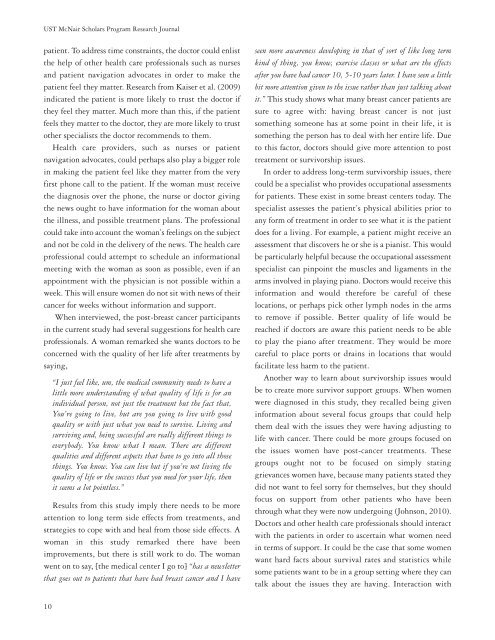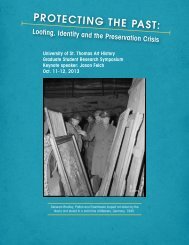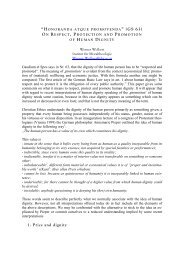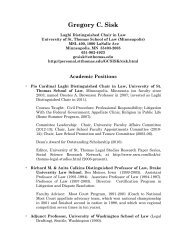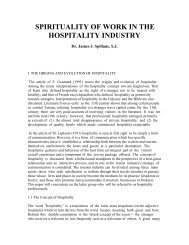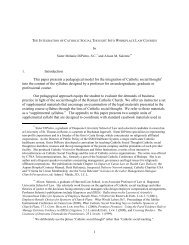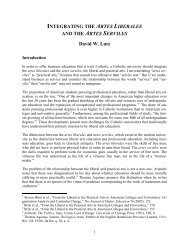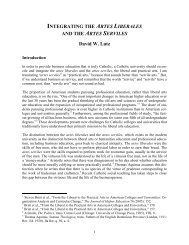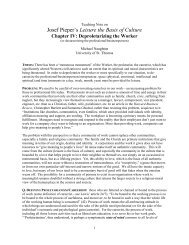dr. ronald e. mcnair acknowledgements - University of St. Thomas
dr. ronald e. mcnair acknowledgements - University of St. Thomas
dr. ronald e. mcnair acknowledgements - University of St. Thomas
You also want an ePaper? Increase the reach of your titles
YUMPU automatically turns print PDFs into web optimized ePapers that Google loves.
UST McNair Scholars Program Research Journal<br />
patient. To ad<strong>dr</strong>ess time constraints, the doctor could enlist<br />
the help <strong>of</strong> other health care pr<strong>of</strong>essionals such as nurses<br />
and patient navigation advocates in order to make the<br />
patient feel they matter. Research from Kaiser et al. (2009)<br />
indicated the patient is more likely to trust the doctor if<br />
they feel they matter. Much more than this, if the patient<br />
feels they matter to the doctor, they are more likely to trust<br />
other specialists the doctor recommends to them.<br />
Health care providers, such as nurses or patient<br />
navigation advocates, could perhaps also play a bigger role<br />
in making the patient feel like they matter from the very<br />
first phone call to the patient. If the woman must receive<br />
the diagnosis over the phone, the nurse or doctor giving<br />
the news ought to have information for the woman about<br />
the illness, and possible treatment plans. The pr<strong>of</strong>essional<br />
could take into account the woman’s feelings on the subject<br />
and not be cold in the delivery <strong>of</strong> the news. The health care<br />
pr<strong>of</strong>essional could attempt to schedule an informational<br />
meeting with the woman as soon as possible, even if an<br />
appointment with the physician is not possible within a<br />
week. This will ensure women do not sit with news <strong>of</strong> their<br />
cancer for weeks without information and support.<br />
When interviewed, the post-breast cancer participants<br />
in the current study had several suggestions for health care<br />
pr<strong>of</strong>essionals. A woman remarked she wants doctors to be<br />
concerned with the quality <strong>of</strong> her life after treatments by<br />
saying,<br />
10<br />
“I just feel like, um, the medical community needs to have a<br />
little more understanding <strong>of</strong> what quality <strong>of</strong> life is for an<br />
individual person, not just the treatment but the fact that,<br />
You’re going to live, but are you going to live with good<br />
quality or with just what you need to survive. Living and<br />
surviving and, being successful are really different things to<br />
everybody. You know what I mean. There are different<br />
qualities and different aspects that have to go into all those<br />
things. You know. You can live but if you’re not living the<br />
quality <strong>of</strong> life or the success that you need for your life, then<br />
it seems a lot pointless.”<br />
Results from this study imply there needs to be more<br />
attention to long term side effects from treatments, and<br />
strategies to cope with and heal from those side effects. A<br />
woman in this study remarked there have been<br />
improvements, but there is still work to do. The woman<br />
went on to say, [the medical center I go to] “has a newsletter<br />
that goes out to patients that have had breast cancer and I have<br />
seen more awareness developing in that <strong>of</strong> sort <strong>of</strong> like long term<br />
kind <strong>of</strong> thing, you know, exercise classes or what are the effects<br />
after you have had cancer 10, 5-10 years later. I have seen a little<br />
bit more attention given to the issue rather than just talking about<br />
it.” This study shows what many breast cancer patients are<br />
sure to agree with: having breast cancer is not just<br />
something someone has at some point in their life, it is<br />
something the person has to deal with her entire life. Due<br />
to this factor, doctors should give more attention to post<br />
treatment or survivorship issues.<br />
In order to ad<strong>dr</strong>ess long-term survivorship issues, there<br />
could be a specialist who provides occupational assessments<br />
for patients. These exist in some breast centers today. The<br />
specialist assesses the patient’s physical abilities prior to<br />
any form <strong>of</strong> treatment in order to see what it is the patient<br />
does for a living. For example, a patient might receive an<br />
assessment that discovers he or she is a pianist. This would<br />
be particularly helpful because the occupational assessment<br />
specialist can pinpoint the muscles and ligaments in the<br />
arms involved in playing piano. Doctors would receive this<br />
information and would therefore be careful <strong>of</strong> these<br />
locations, or perhaps pick other lymph nodes in the arms<br />
to remove if possible. Better quality <strong>of</strong> life would be<br />
reached if doctors are aware this patient needs to be able<br />
to play the piano after treatment. They would be more<br />
careful to place ports or <strong>dr</strong>ains in locations that would<br />
facilitate less harm to the patient.<br />
Another way to learn about survivorship issues would<br />
be to create more survivor support groups. When women<br />
were diagnosed in this study, they recalled being given<br />
information about several focus groups that could help<br />
them deal with the issues they were having adjusting to<br />
life with cancer. There could be more groups focused on<br />
the issues women have post-cancer treatments. These<br />
groups ought not to be focused on simply stating<br />
grievances women have, because many patients stated they<br />
did not want to feel sorry for themselves, but they should<br />
focus on support from other patients who have been<br />
through what they were now undergoing (Johnson, 2010).<br />
Doctors and other health care pr<strong>of</strong>essionals should interact<br />
with the patients in order to ascertain what women need<br />
in terms <strong>of</strong> support. It could be the case that some women<br />
want hard facts about survival rates and statistics while<br />
some patients want to be in a group setting where they can<br />
talk about the issues they are having. Interaction with


